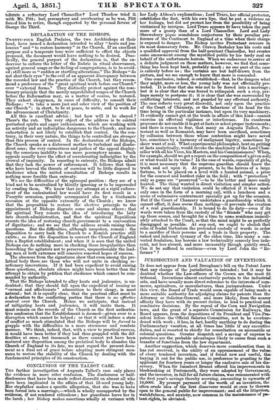• CONCLUSION OF THE TALBOT CAE.
THE further investigation of Augusta Talbot's ease only places the evidence in more utter confusion. The disclosures or half- disclosures that have been made reflect discredit on almost all who have been implicated in the affairs of that ill-used young lady. Her stepfather makes a specific allegation, that she was to have been forced into a marriage,—which is wholly unsupported by the evident*, if not rendered ridiculous ; her guardians leave her in the lurch ; her Bishop makes assertions wholly at variance with her Lady Abbess's explithaffons ; Lortictio—, her official protector, establishes' the fact, with his own lips, that he put a violence on her feelings, but did not protect her from the 'possibility of being victimized by intrigue. Lord Truro appears tit have- taken the part more of a gossip than of a Lord Chancellor. Lord and Lady Shrewsbury pique scandalous conjectures by their peculiar pre- ference of the Continent to England at a time when their charge is exposed to danger. The Bishop invites Protestant censure in its most damnatory form: Mr. Craven Berkeley has his costs and a qualified approval from the half-penitent Chancellor, but creates some amusement among the mystified public by his tardy zeal on behalf of the unfortunate heiress. When we endeavour to arrive at a definite judgment on these matters, however, we find that some- thing has been kept back, probably much ; no one part of the ease is entirely before us ; the curtains are but half-drawn from the picture, and we see enough to know that more is concealed. One conclusion, indeed, is established—that, be the dangers what they might, more or less, the young lady was not effectually pro- tected. It is clear that she was not to be forced into a marriage; but it is clear that she was forced to relinquish such a step, per- haps merely to postpone' it ; it is clear that she was surrounded by conflicting interests, and not guarded' by any effectual authority. The case reflects very great' discredit, not only upon the practice of the. Court of Chancery,, or the behaviour of its head for the time being in the particular instance, but upon its vary tesphinpay It evidently cannot get at the truth in. affairs of this kind—cannot exercise an effectual vigilance or interference. Its cumbrous processes do not enable it to get at facts;or select proper instruments;. and there is reason to fear, that many an Augusta Talbot, Pro- testant as well as Romanist„ may have been sacrificed, sometimes by collusion between those whose contention might have saved. her, sometimes by a harmony of malignant bigotry, sometimes by. sheer want of zeal. What experimental philosopher, bent on getting at facts analytically, would_ invoke the machinery of the Lord Chan.- cellor with all his Vices, his Masters, andhis Commissioners? When, for example, should we get a report on the composition of a given. soil;, or what would be its value 7 In the case of wards, especially of girls,. it is most necessary that the supreme guardian should know the truth and act upon it. At present, to be the. heiress of a large fortune, is to be placedon. a. level with a hunted_ animal, a. prize for the coarsest and hardest rider in the field ; with "protection." only as game are "preserved."—to be the better and more easily hunted. The thing wanted is direct visitation and simpler action._ We do not say that visitation. could be effected if it were made only once in the form of a. morning call, with a luncheon_ and. a scene of submissive contentment. specially got up for the occasion. But if the Court of Chancery undertakes a guardianship which it cannot effect, it does worse than, nothing—it prevents the creation_ of a real guardianship.. It is-bound to do its duty—even if its wards were taken from the custody of the." friends" who may up those scenes, and brought for a time, to some residence • ra i 4- ately attached to the Court„so that the mind might be as perfectly disengaged as possible. At any cost, we ought to abolish that relic_ of feudal barbarism the pretended custody of wards in order to a sacrifice of their persons and_ a. trade in their property. The naked and indecent tyranny of the olden time, like many a con, vetted feudalism, has become a law technicality scarcely- less inde- cent, not less absurd, and more- inexorably though quietly craeL Can. it be suffered_ to continne,-even. by Lord. John the " Re- former " ?






























 Previous page
Previous page